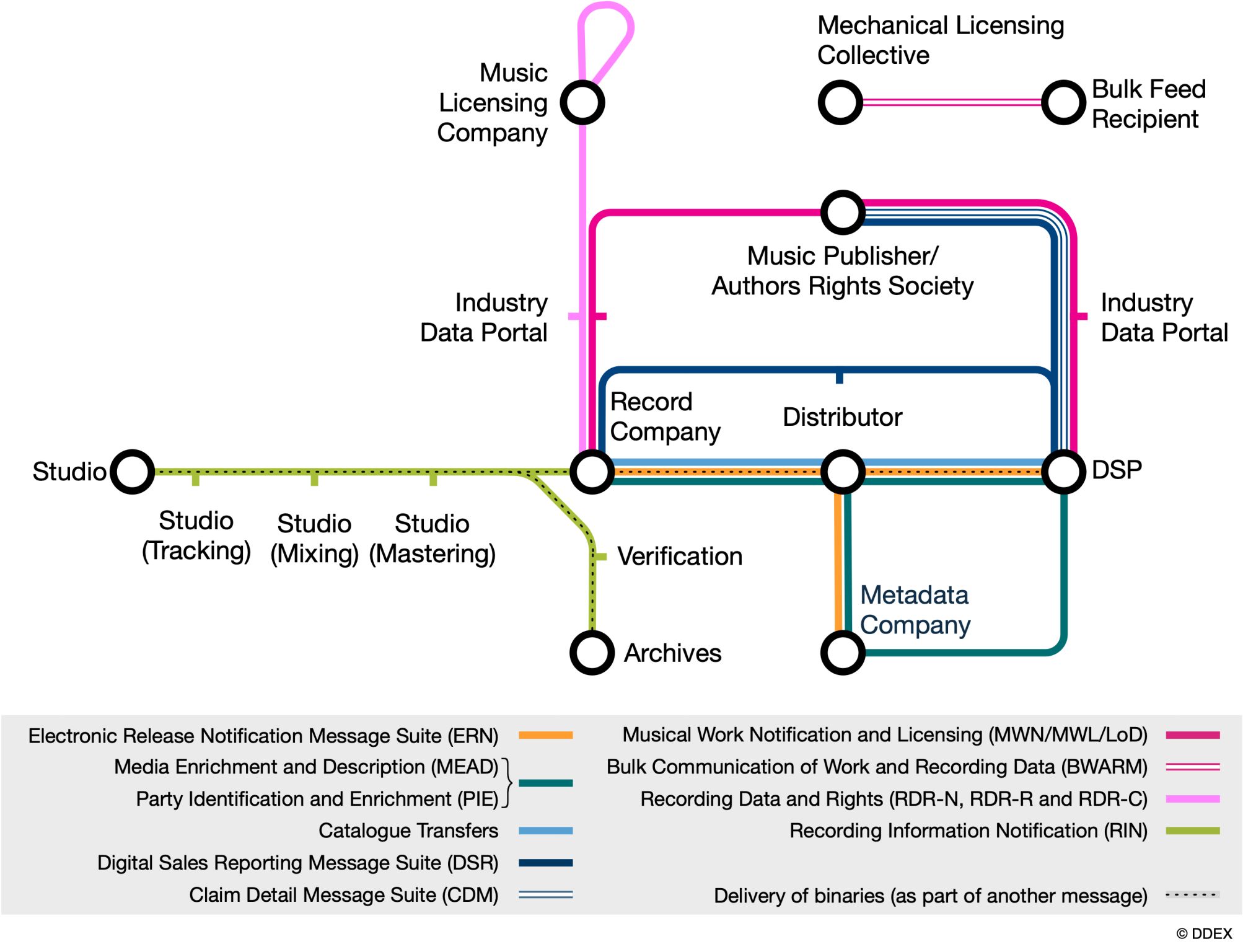Metadata is everything and we have the hat to prove it.
But, as we’ve covered extensively on Synchblog, getting the right metadata flowing through the music value chain can seem like a Sisyphean task. That’s where DDEX comes in.
Here, we explore the crucial role that DDEX plays in enabling data communication across the industry and the ways in which data practices need to adapt and evolve.
What is DDEX?
Established in 2006, DDEX, or Digital Data Exchange, is a not-for-profit, membership organisation focused on the creation of digital music value chain standards. In a nutshell, it facilitates the exchange of data between the various players in the industry, helping to build a more robust, fair, and transparent music ecosystem.
The DDEX standards are free for anyone to implement and are used by all the major digital players including DSPs, distributors, record companies, music licensing companies, music publishers, and various technical service providers.
The Synchtank platform, for example, enables the management and delivery of assets and data in compliance with DDEX standards.
Each standard is designed to address different needs, such as rights management and catalog transfer. They include:
- Electronic Release Notification Message Suite (ERN)
- Digital Sales Reporting Message Suite (DSR)
- Recording Data and Rights standards (RDR)
- Musical Works Data and Rights standard (MWDR)

The DDEX ‘tube map’ of standards
Why it matters
Put simply, standards save money and drive efficiency, particularly when operating at the vast scale of the music industry today. Key benefits of the DDEX standards include:
- Enhancing the user experience – by providing rich information about musical works, sound recordings or music videos, for example to support voice-activated music discovery and playback.
- Creating efficiency in data management – through automated data exchange and data handling, facilitating quicker transactions and less duplication of work.
- Enabling fairer compensation – thanks to improved data quality and more precise tracking and distribution of royalties as well as increased transparency.
- Future-proofing operations – ensuring industry players can evolve with ongoing changes in the digital music landscape.
- Fostering collaboration and interoperability – allowing various entities in the industry to share data and adopt a more streamlined, cooperative approach.
Challenges and developments
Despite significant progress being made, which can largely be attributed to the adoption of DDEX standards, there is still much room for improvement in the industry’s data exchange practices.
A reluctancy to share data further exacerbates this, whether it’s various players protecting their proprietary datasets or DSPs being overly competitive with data.
While data accuracy remains the biggest problem of all, more efforts are being made across the industry to validate data through the artist at the beginning of the process, and the industry is also finding more ways to clean up historic data messes. DDEX, for example, is working with ISNI to identify and resolve data discrepancies.
Mapping compositions to recordings as early as possible in the value chain (ideally at pre-release) is also an increasing priority across the industry, as is earlier allocation of the ISWC identifier.
As the digital content ecosystem continues to rapidly scale, the need to integrate more metadata and work collaboratively across the value chain has never been greater.
The potential impact of AI
As we move into a brave new world where AI generated content becomes increasingly mainstream, the implications for music and metadata are likely to be significant.
If 100,000 tracks being uploaded to DSPs every day sounds like a lot, imagine what happens when that doubles or even quadruples. How do you go about qualifying a flood of new content and find ways to identify it?
Ironically, AI tools are now being deployed to counter potential AI fraud and copyright infringement as well as the misuse of voices, names, images and likenesses, or to simply flag the use of AI of any sort in a track.
While the legal framework around AI and copyright remains unknown, the human (not robotic) minds at DDEX will undoubtedly be keeping a close eye on these developments and the standards required to facilitate consent, credit, and compensation in this new era.
Head here to learn more about how Synchtank’s asset management and delivery platform supports DDEX standards.
Enjoyed this article? Why not check out:
- How AI is Revolutionizing Music Discovery and Unlocking More Value From Catalogs
- Turning Guessing Into Knowing: Why a Well-Tagged Catalog Is Key For Good Content Strategies
- Why Music Search is So Complex, and How AI is Helping Us Navigate Surging Content Volumes
